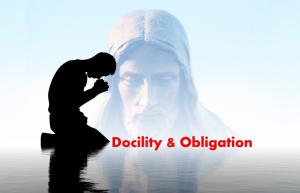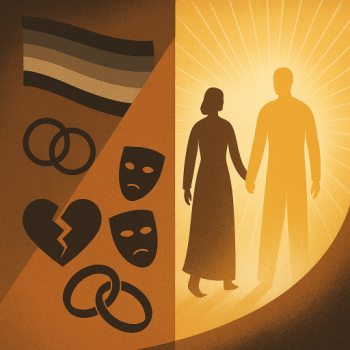In the US, two words seem to trigger negative emotions among Catholics more than any other: docility and obligation. Now, many US Catholics reading this will think I overstate the situation. They may feel no initial emotional response at all to words like docility and obligation. However, if they take the time to examine the role of docility and obligation in Catholicism, they will inevitably arrive at a strong emotional response. In short, US Catholics do not like others, including other authorities, telling them what to think or how to live.
Allow me to explain.
What Does Docility Mean, Really?
According to the Mirriam Webster online dictionary, docility (or docile) means:
1: easily taught
a docile pupil
2: easily led or managed: tractable
a docile pony
Docile implies a predisposition to submit readily to control or guidance.
Therefore, a docile person possesses a predisposition to submit to control or guidance. In Catholic terms, a docile Catholic possesses a predisposition to submit to Church authority and teaching.
What Does the Catechism Teach on Docility?
87 Mindful of Christ’s words to his apostles: “He who hears you, hears me”. The faithful receive with docility the teachings and directives that their pastors give them in different forms. [emphasis added]
2037 The law of God entrusted to the Church is taught to the faithful as the way of life and truth. The faithful therefore have the right to be instructed in the divine saving precepts that purify judgment and, with grace, heal wounded human reason. They have the duty of observing the constitutions and decrees conveyed by the legitimate authority of the Church. Even if they concern disciplinary matters, these determinations call for docility in charity. [emphasis added]
The Church teaches that, due to her divine nature rooted in Christ, the faithful receive the Church’s instruction as coming from Christ Himself. The faithful hear the Church because the faithful hear Christ. Therefore, as the faithful submits to Christ, they submit to the Church. This, then, encapsulates how the faithful ought to understand the word docility. We must ask ourselves, do we as the faithful possess a predisposition of docility? If not, why not?
What is an Obligation?
Referring to the Mirriam Webster online dictionary, we read the following definitions of obligation:
1: the action of obligating oneself to a course of action (as by a promise or vow)
2 a: something (such as a formal contract, a promise, or the demands of conscience or custom) that obligates one to a course of action
made an obligation to pay their children’s college expenses
b: a debt security (such as a mortgage or corporate bond)
c: a commitment (as by a government) to pay a particular sum of money
also: an amount owed under such an obligation
Unable to meet its obligations, the company went into bankruptcy.
3 a: a condition or feeling of being obligated
felt an obligation to vote
b: a debt of gratitude
returned the favor as an obligation
4: something one is bound to do : duty, responsibility
countries in which military service is an obligation
fulfilled their familial obligations
Basically, one under an obligation owes a favor, or a debt. Concerning Christianity, Christians owe a debt of gratitude to God for creating them and ultimately saving them through Jesus Christ. In this context, the Catechism addresses what the Catholic Church means by obligation.
What Does the Catechism Teach on Obligation?
2041 The precepts of the Church are set in the context of a moral life bound to and nourished by liturgical life. the obligatory character of these positive laws decreed by the pastoral authorities is meant to guarantee to the faithful the indispensable minimum in the spirit of prayer and moral effort, in the growth in love of God and neighbor:
According to the Catechism, the Church requires a minimum obligation: the five precepts. These precepts include:
- (“You shall attend Mass on Sundays and holy days of obligation.”) requires the faithful to participate in the Eucharistic celebration when the Christian community gathers together on the day commemorating the Resurrection of the Lord.
- (“You shall confess your sins at least once a year.”) ensures preparation for the Eucharist by the reception of the sacrament of reconciliation, which continues Baptism’s work of conversion and forgiveness.
- (“You shall humbly receive your Creator in Holy Communion at least during the Easter season.”) guarantees as a minimum the reception of the Lord’s Body and Blood in connection with the Paschal feasts, the origin and center of the Christian liturgy.
- (“You shall keep holy the holy days of obligation.”) completes the Sunday observance by participation in the principal liturgical feasts which honor the mysteries of the Lord, the Virgin Mary, and the saints.
- (“You shall observe the prescribed days of fasting and abstinence.”) ensures the times of ascesis and penance which prepare us for the liturgical feasts; they help us acquire mastery over our instincts and freedom of heart.
Again, the above reflects the bare minimum a Christian owes in obligation to God. To participate in these minimum moments of grace contributes to continued growth in the love of God. In the Eucharist, Catholics partake in the body and blood of the Lord. In Confession, Catholics reconcile with God and His Church as they continue to grow in holiness and conversion. In attending Mass and Holy Days, Catholics celebrate Christ’s resurrection with the Christian community.
What of Those Catholics Who Dissent or Don’t Want to Go to Mass?
Moreover, let’s circle back to the initial point regarding the two triggering words docility and obligation. Many US Catholics dissent from Church moral teaching, especially concerning Church teachings on human sexuality and marriage. These same Catholics appeal to conscience to justify their dissent. Some even go so far as to humanize and delegitimize Church authority as mere “rules of men.” In no way do these appeals reflect anything approaching docility. They also fail to consider what is required for a well-formed conscience.
Furthermore, despite all Christ did in His life, death, and resurrection, some Catholics bemoan any sort of obligation in appreciation of and repaying a debt of gratitude with even one hour a week. Many may even call me judgmental for pointing this last fact out. I ask them to hold their own judgement and to meditate on all Christ did (and continues to do) for them.
Final Thoughts…
In closing, I make a final appeal to reframe our initial negative reactions to words like docility and obligation. Catholics in the US do not like other people (or institutions) telling them how to think or how to live. However, if Catholics truly seek to follow Christ, how can we not also accept His Church’s teaching with docility and do the bare minimum of our obligation (in the least)? The Catechism sums up the situation Catholics find themselves in perfectly:
2037 The law of God entrusted to the Church is taught to the faithful as the way of life and truth. The faithful therefore have the right to be instructed in the divine saving precepts that purify judgment and, with grace, heal wounded human reason. They have the duty of observing the constitutions and decrees conveyed by the legitimate authority of the Church. Even if they concern disciplinary matters, these determinations call for docility in charity.
What do you think?
Thank you!
Read The Latin Right’s other writing here.
Please visit my Facebook page and IM your questions (and follow my page) or topics for articles you would like covered.
Also, please subscribe my YouTube page for updates on upcoming articles.













